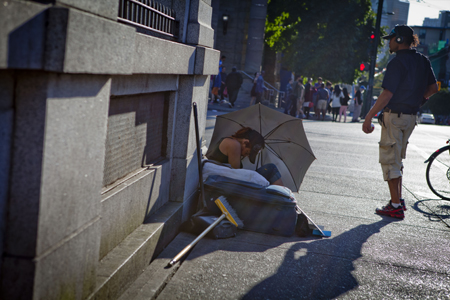People living in poorer neighbourhoods that tend to get hotter have a higher risk of death during extreme heat events, according to research from the School of Population and Public Health.
“Climate change has increased the frequency and intensity of extreme hot weather events,” said Sarah Henderson, an Assistant Professor and Research Scientist at the BC Centre for Disease Control. “Being able to map and target the most vulnerable areas will be highly beneficial for public health intervention.”
The researchers used maps of urban heat islands where the humidex would climb over 34.4 degrees Celsius, and the Vancouver Area Neighborhood Deprivation Index (VANDIX) to examine the relationship between temperature and mortality on very hot days from 1998 to 2014. The VANDIX is a public health research tool that measures material and social deprivation factors, such as education and unemployment rate.
The study, published in Environmental Health Perspectives, showed pockets of risk throughout the region including Vancouver’s Downtown Eastside but also in neighbourhoods that are not associated with extreme deprivation in Abbotsford, Surrey, New Westminster and throughout the Lower Mainland. The risk of death is higher in neighborhoods with lots of concrete and not a lot of trees and where people were not working because they are either unemployed or retired.
“In one week in 2009, 110 people died simply because it was hot outside,” said Dr. Henderson, pointing out that many of the people who died were younger seniors aged 60 to 70 and not the very elderly.
She believes that part of the problem may be that people are staying in hot homes during the day and not heading to offices or other places that might be cooler or air conditioned. More people die at home when it is extremely hot outside.
“Keeping cool is the key to staying safe in hot weather,” Dr. Henderson said. “Go to places with air conditioning, wet down your shirt with cool water, and you must drink plenty of water even if you don’t feel thirsty.”
